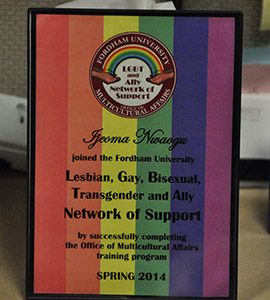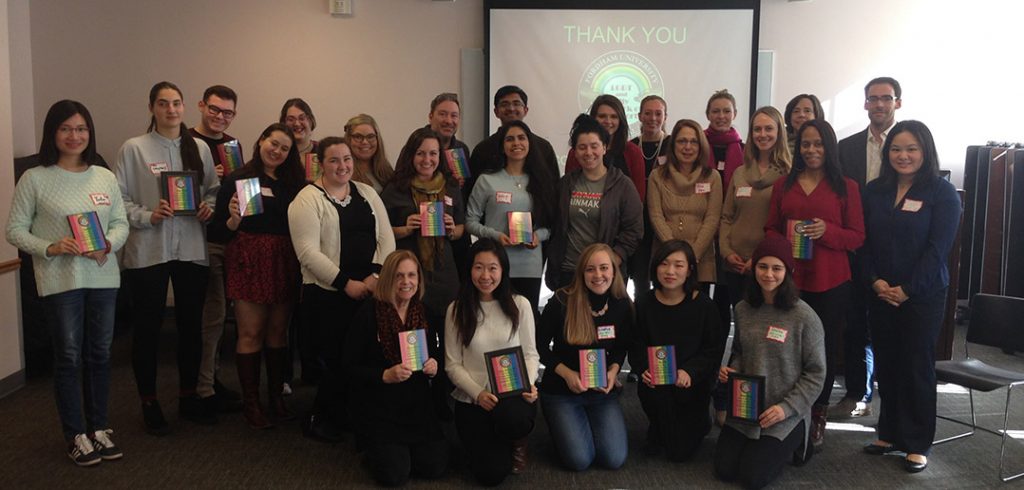Whoever has one has completed a Fordham University workshop on creating an accepting environment for lesbian, gay, bisexual, and transgender (LGBT) students. Now in its seventh year, the workshop program received a new national award this week for its efforts to educate people from across the University community—students, faculty, staff—about the many ways in which they can make LGBT students feel at home.
The program is the LGBT and Ally Network of Support, and LGBT students at Fordham are taking notice as more people complete its training, according to the administrator who oversees it.
“Seeing that rainbow certificate gives them an open door to be more comfortable if they do identify as LGBT, and that’s what we’ve been seeing sort of percolate through the Fordham community,” said Assistant Dean Juan Carlos Matos, director of the Office of Multicultural Affairs, which runs the program.
On March 15, the program was honored at the annual conference of NASPA, the membership organization for student affairs administrators in higher education. Fordham’s program received the Exemplary Program Award from the NASPA GLBT Knowledge Community, one of many NASPA communities devoted to various aspects of student affairs.
Institutions are putting more effort into being welcoming to all students, including LGBT students, said Kimmi Cantrell, the knowledge community’s awards coordinator.
“As professionals, we have to ensure that we’re prepared to provide (LGBT students) the resources that they need,” she said. “There are a lot of different students who come from these communities and don’t have support from their family or their friends or whatever the case may be.”

Fordham’s LGBT and Ally Network of Support holds workshops twice a year at both the Rose Hill and Lincoln Center campuses, with an estimated 100 to 120 people completing the workshop per year, Matos said.
The program is framed in terms of the Fordham mission of cura personalis—or care of the whole person—and the Catholic principle of treating all persons with dignity and respect. The workshops’ diverse speakers include a member of the Society of Jesus and the dean of students from the Rose Hill and Lincoln Center campuses. Members of the counseling and psychological services staff talk about listening skills and other topics, and a student discusses his or her “coming out” process.
Topics include gender-neutral pronouns, identity models, and campus resources to help LGBT students. Through exercises, participants learn to imagine the possible experiences of LGBT students, like being marginalized or being rejected by family members because of one’s sexual orientation.
“One of the most valuable things that comes out of the training would have to be empathy,” said Ijeoma Nwaogu, PhD, assistant director of the Office of Multicultural Affairs. Through some of the activities, she said, “we’re saying, ‘This is what LGBT individuals face, and how would it feel if you were in that situation?’”
“I think everyone needs to participate” in the workshop, she said. “I think everyone needs an opportunity to begin that process of unlearning a lot of the stereotypes and assumptions that we have about LGBT folk, and Fordham provides a space through this training opportunity.”
This type of program doesn’t usually bring together students, faculty and administrators, as Fordham’s does, Matos said. “I do feel there is some safety in that,” he said. “I think there are very few spaces that exist where you can have all those individuals together to talk about this one topic.”
The mere existence of the program eases students’ worries, he said: “On multiple occasions, there have been folks that share with us, ‘I’m not able to come to the training, but I’m so appreciative that this even exists.’”

